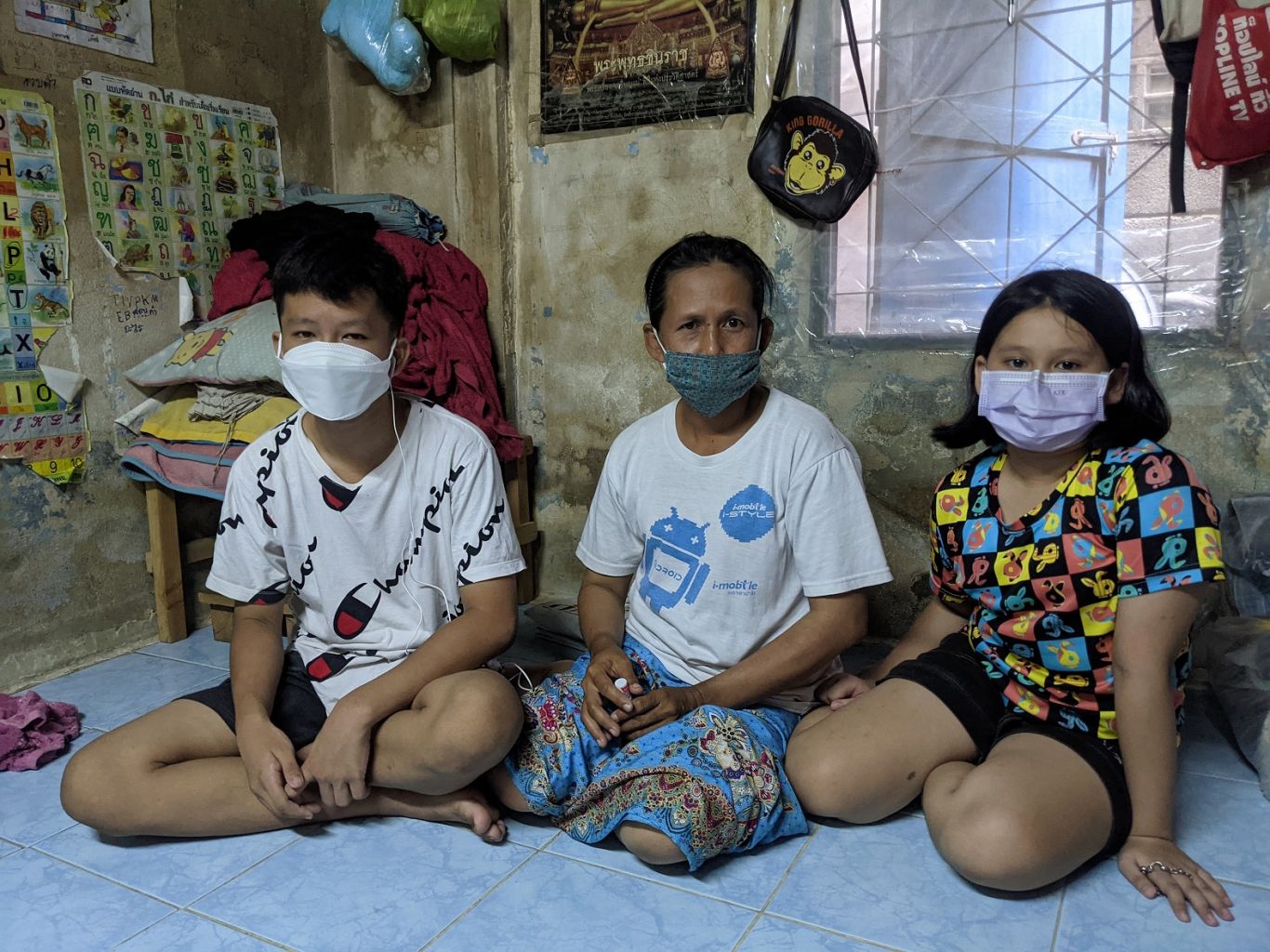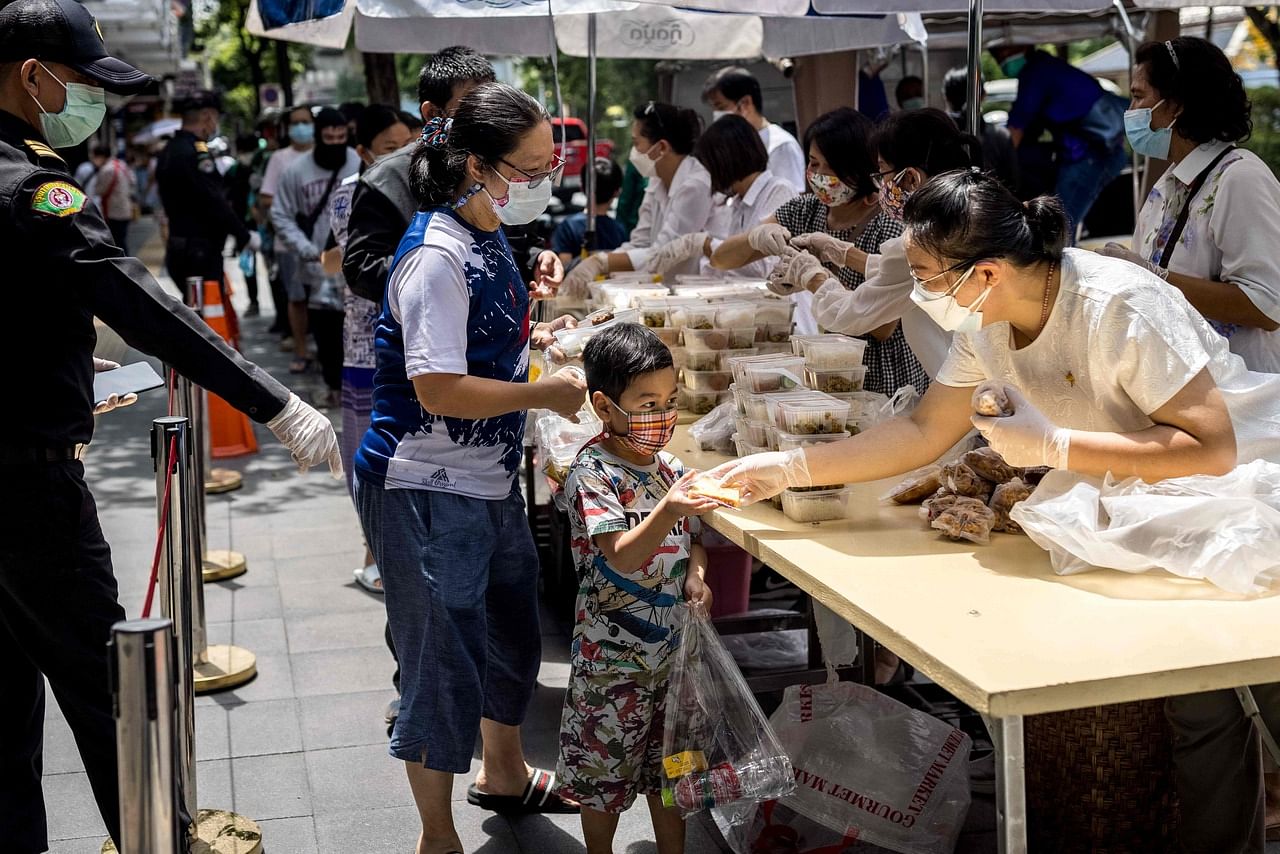Thailand seeing 'children's rights crisis' due to Covid-19: Unicef official
Sign up now: Get insights on Asia's fast-moving developments

Student Peerapat Tiemkoksung, seen here with his mother Somporn Boonnoi and sister Pornphan, has found remote learning to be a challenge, especially because his family used to own only one mobile device.
ST PHOTO: TAN TAM MEI
Follow topic:
BANGKOK - Since the new school year started this year, 15-year-old Peerapat Tiemkoksung has found it a challenge to keep up with lessons online.
Not only does he find at-home learning difficult to follow, with the absence of textbooks and worksheets, but his attendance also used to vary, depending on who in his family got to use the one smartphone shared between the high school student, his 10-year-old sister Pornphan and his mother.
"When I'm at work, I have to take the phone with me," said Madam Somporn Boonnoi, 46, a widow who works as a porter. "But that means they cannot attend class."
In recent weeks, the situation has improved for Peerapat, after his mother bought him his own smartphone to attend virtual classes. It set her back 4,000 baht (S$164), which Madam Somporn admitted adds weight to the family's finances, which were already affected by the pandemic.
"I just don't want him to drop out of school," said Madam Somporn, who has taken a second job to keep the family afloat.
Children like Peerapat are facing a more uncertain future, said youth welfare groups in Thailand.
They added that governments must take stock of the Covid-19 pandemic's long-term effects on the young and not just focus on the devastating consequences measured through indicators such as numbers for infections and deaths, as well as employment and other economic figures.
Describing it as a "children's rights crisis", chief of Child Protection at Unicef Thailand Nicola Brandt said that besides the direct health impact of Covid-19 on children, one must remember the indelible effects on education and their long-term socio-economic situation.
"We must therefore do everything we can to protect every child's right to live and grow up in an environment that supports their physical, psychological, social and emotional development," she added.
Schools in Bangkok and other provinces hardest hit by Covid-19 have mostly remained online, since Thailand's third and worst Covid-19 wave began in April. As a result, students like Peerapat started the academic year with almost no face-to-face interaction with teachers or classmates.
"I wonder if my friends will recognise me when we meet again," said Peerapat, who misses playing soccer and chit-chatting with his peers.
When schools went online for the first time last year, many families and students were not prepared for it. Over half of the households surveyed in a government study last year did not have access to devices for online learning, and more than a quarter lacked Internet access to attend virtual classes.
Disruptions to a child's education will have long-term effects, said Ms Brandt, adding that the pandemic has also set back existing efforts to help vulnerable groups' access to education, protective services and food security.
Before the pandemic, there were already concerns about the quality of learning and access to education in Thailand, said Ms Brandt, who noted that before Covid-19 hit, around 18 per cent of those of high school age did not attend school.
High school student Wannapha Boonphan, 16, said her grades have been falling as she has been unable to adapt to online learning, and this has affected her confidence.
She is worried that she will fall further behind in her schoolwork.
"My dream is to work in movie production, but if I cannot finish high school, how can I do that?" she said.
There is anecdotal evidence of more high school students dropping out of school, according to the Duang Prateep Foundation, which provides education and scholarship opportunities to children in low-income communities in Bangkok.
"The child could be facing difficulties learning online. School might also become less of a priority if the family is going through financial difficulties," said its founder Prateep Ungsongtham Hata, 69.
Ms Prateep added that the pandemic has also put vulnerable children at greater risk, as many low-income families suffer greater financial hardship as incomes plunge.

The pandemic has also put vulnerable children at greater risk.
PHOTO: AFP
More people have also found themselves living below the poverty line, according to a study on the social and economic impacts of the pandemic by government organisation Thailand Science Research and Innovation. It found that almost 800,000 more people became impoverished last year as a result of the Covid-19 pandemic.
Another survey of families in poverty by the Education Equity Fund last year showed that 41 per cent of parents reported reduced income and 14 per cent lost their jobs.
Referencing the survey, Unicef's Ms Brandt said: "This trend, if not addressed, can lead to increased school drop-out rates and families cutting back on essential health expenditure or food security."
But, beyond the impact on education and family finances, advocates for youth said it is the mental well-being of children that has borne the brunt during the pandemic.
Mr Ilya Smirnoff, executive director of Childline Thailand Foundation, which runs a 24-hour helpline and a drop-in centre for those below age 18, said he has seen rising levels of anxiety in youth who call or contact the centre via online channels.
The number of calls spiked in March this year as the latest Covid-19 wave swept Thailand. Since January, the centre has received more than 24,000 calls, with the top being issues related to mental health and family or peer relationships. There were also calls about domestic abuse and problems with school or work.
"I don't think we understand just how profoundly this generation of children will be affected. They have been robbed of the opportunity to build the required social networks and skill set for life," said Mr Smirnoff, of the Covid-19 restrictions that have isolated many youth from their peers.
"Not only is a big chunk of the growing-up experience missing, but they also have less certainty of the future, because the pandemic leaves them with many questions," he said. "It's traumatic."
Finally, the loss of adult loved ones and caregivers from Covid-19 cannot be ignored.
In Thailand, about 5,000 children have lost a parent to Covid-19, reported the Bangkok Post, citing the Child and Adolescent Mental Health Rajanagarindra Institute.
The death of a loved one to Covid-19 is perhaps the most devastating long-term impact that children can face during the pandemic, said Ms Prateep.
"These emotions can affect them even as they grow older. If they cannot overcome this grief, they no longer want to fight for a better future.
"It leaves a big scar on their hearts."

